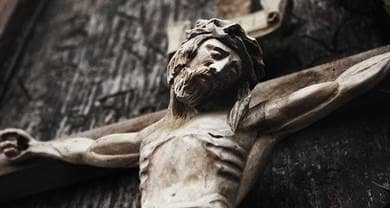- Trending:
- Pope Leo Xiv
- |
- Israel
- |
- Trump
- |
- Social Justice
- |
- Peace
- |
- Love

RELIGION LIBRARY
Roman Catholicism
Sacred Narratives
The Hebrew scriptures (usually known to Christians as the Old Testament) and the New Testament lay the basic groundwork for the Catholic understanding of all reality. They show God as the creator of the world and everything in it, including humanity; humans as initially created to live in harmony with God and the world, but breaking that harmony through sin; God's ongoing interaction with humans and his continual call to resume and repair the broken relationship; and a future end of this world, once again fully in harmony with God.
Catholics understand the two major parts of the Bible to be "testaments" because they testify to the centrality of Christ in God's plan for the world and the humans within it. They believe that even the stories that do not mention Jesus by name are in some way pointing to his existence and his role in bringing humans back into right relationship with God, which makes the story of Jesus the Christ the most important narrative that Catholics hold to be sacred.
In Jesus, Catholics believe, God became incarnate-a living, breathing human being. The miraculous birth and events of Jesus' life point to his divine nature; his words and deeds show humans the way they should go about living in the world. Most important of all, Jesus' sacrificial death and resurrection make it possible for humans to become reconciled to God. Theories and theologies differ about how exactly this happens, but essentially Catholics believe that Jesus lived a life untouched by sin and yet chose to accept the punishment for sin, which is death; in doing so he repaired the broken human relationship with God. This reparation of the divine-human relationship is known as "atonement," literally "at-one-ment," which human beings could not accomplish by their own capacities; only God could heal the relationship. Nothing can be more central than this to the faith of Catholicism, and in fact all other sacred stories, all doctrine and dogma, flow from it.
All Christians hold the Bible to be divinely inspired, but there is disagreement over what exactly this means. Catholics believe that God inspired the human authors of the Bible with knowledge of the truths they would present, but did not dictate the actual words that they would write. For Catholics, what is most important in the biblical stories is what they explain about humanity's ongoing relationship with God, not always the literal meaning of the words. The biblical stories have been interpreted allegorically and symbolically since very early in Christian history, a practice that was given its classical formulation by St. Augustine (354-430). He said that Christians must approach the biblical stories with the full weight of their logic as well as of their faith, looking to the allegorical level of interpretation when the literal level contravenes reason. An expanded version of this methodology has become the standard Catholic approach to scripture.
While almost all Christians agree on the centrality of scripture, Catholics differ from most other Christian groups in giving equal weight to another sacred narrative known collectively as tradition. Tradition is the living transmission of sacred truth by the Holy Spirit through the teachings of the Church. It is most often represented in written form in the writings of the Church Fathers, the edicts of Church councils, and papal encyclicals. The Church Fathers are theologians and writers from the early centuries after Jesus who defined many of the doctrines that became foundational in Catholic Christian theology, such as what it means for Jesus to be fully human and fully divine and how the one God can be expressed in the persons of the Father, Son, and Holy Spirit. Church councils, which are gatherings of the Church's bishops, have dealt with similarly thorny theological issues. When popes send out official documents known as papal encyclicals, they are acting as leaders of the faithful and Christ's direct representatives on earth; these works are understood to express the shared faith of believers and usually deal with matters of theology, society, and morality. All these writings carry the full weight of the teaching authority that Christ entrusted to his Church.
Catholics believe that scripture and tradition together point to the sacred narrative of the Church itself, which is the vehicle of God's continuing work in the world. Revelation did not end with the closing of the New Testament but persists in the Holy Spirit's guidance of the Church. When Jesus' apostles gathered for the feast of Pentecost shortly following his death and resurrection, "suddenly a sound like the blowing of a violent wind came from heaven" as tongues of fire appeared over their heads and they received the ability to speak in languages they had not previously known (Acts 2:1-4). This, Catholics believe, was the Holy Spirit suffusing the leaders of the emerging Church with powers of teaching authority and proclamation, a power that Jesus had given particularly to his disciple Peter (meaning Rock), declaring that "on this rock I will build my church" (Matthew 16:18).
The Book of Acts illustrates Peter's leadership among the apostles, and by the early 2nd century Church leaders such as Bishop Ignatius of Antioch would recognize Peter as the first bishop of Rome and the beginning of the line of leadership that stretched down to their time and beyond. These are the men who are now call the popes, and Catholics believe that their leadership is a vital part of the sacred narrative of God's unending presence in the world through the medium of the Church.
Beyond the two major poles of Catholicism's sacred narratives lie other stories such as the biographies of saints. Saints are people who followed the example of Jesus in living their lives closely in communion with God and were able to overcome great adversities with faith. The accounts of saints' lives and deeds are known as hagiographies, and they often tell of miraculous acts the saints performed and their ability to withstand extraordinary suffering and even death without breaking their faith in God's love and mercy.
The lives of the saints are held up as models for all Catholics to follow, and Catholics are encouraged to call upon them as intercessors before God, just as someone might ask living loved ones to pray for him or her. Devotions to different saints emerged from the belief in the "communion of saints," the trust that all the faithful, living and dead, share a bond of faith; frequently, these devotions were related to factors such as the saint's birthplace, profession, or lifestyle that encouraged imitation.
Study Questions:
1. Why do Catholics hold the entirety of the Bible to be sacred?
2. What sacred narrative is associated with Jesus’ life? Why is still held in high regard amongst Catholics?
3. Do Catholics hold the Bible as inerrant? Why or why not?
4. Why is tradition important to the understanding of scripture?










